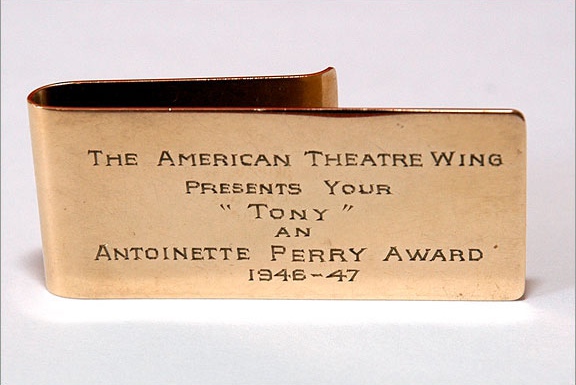
The First Tony Ceremony: He Was There
Max Wilk was a playwright, screenwriter, and theatre historian who attended the American Theatre Wing’s very first Tony Awards ceremony in 1947. In 2006, when he was in his late 80s, Mr. Wilk came to Manhattan from his home in Connecticut one afternoon to chat with TonyAwards.com's Ben Pesner. He reminisced about the Tonys and their namesake, Antoinette Perry.
Ben Pesner: Tell me about your connection to the Tony Awards.
Max Wilk: It was my father’s passion to be friends with Brock Pemberton and Antoinette Perry. He thought they were wonderful people. As a story editor for Warner Brothers, he was essentially a man of the theatre. He knew where the theatre was, and what was happening [in it]. It gave Warner Brothers a terrific edge to have such a man in New York. [When Antoinette Perry died,] the thing he wanted to do the most for her was to make a yearly show that would keep her name alive in the American theatre. He was darn good at doing it, too. [The Tonys] do keep her name alive, and they are important [for the theatre]. If my father were here, he'd feel good about that.
Q: You went to the first Tony Awards ceremony, in 1947.
Wilk: I went with my mother and father, who had a table. And I said, “I’m going with this lady.” My [future] mother-in-law had been a typist for the lawyers to George M. Cohan and every theatrical person there was. She said to my [future] wife, “It would be a good idea for you to go to this thing and see what happens.” She was enormously impressed that I was going with her daughter. So we went. My wife-to-be sat there looking at all these people in the theatre, and they were coming over, saying [to my father], “Hello, Jake, how are you.” Everybody in show business was there that night! It must have made a hell of an impression on her, because a couple of months later we got married.
Q: And you are still married, nearly 60 years later. How was the Tony ceremony different back in the late forties than it is today?
Wilk: It was at the Waldorf Astoria. Very, very discreet.
Q: What do you mean?
Wilk: They didn’t have big dance numbers. It was rather elegant, and very quiet. It was a different show.
Q: What do you remember about Antoinette Perry?
Wilk: I remember her, but I would be lying to you if I said I knew her. I’d be able to say, “Hello, how are you, Mrs. Perry?” She was a middle-aged lady. She looked very demure. She didn’t throw her weight around at all. It was hard to believe, if you think back upon it, that she was a director. You expect a director to be like when you go to the movies, and see those musicals where somebody is a director. She wasn't like that. She was very quiet. But [people] listened to her.
Q: Her most notable Broadway directing credit was the comedy Harvey.
Wilk: She directed Harvey, and they made the movie the way Perry directed it. She was a hell of a good director. It’s too bad nobody really remembers her, because she was a heroine at that point.
Q: She had been involved with the American Theatre Wing for many years and was the Chairman of the Wing’s Board of Directors during World War II. She died relatively young. What happened next? What did you father say to John Golden and Brock Pemberton, Perry’s great friends?
Wilk: Pretty much this: “We should be doing something to honor Antoinette Perry. I have an idea. Wouldn’t it be interesting to have an evening where we would pay honor to the best show of the year, the best drama, the best playwright, the best this and the best that, and name it after her?” And [Golden] said, "That would be great.” And from then on, it went! It was one of those things you couldn’t say no to. It’s a wonderful idea. I think the subtext was that my father really loved Antoinette Perry, and this was his way of saying, “Let’s do something to show the world who she was.”
Q: You told me you once had lunch with your father, Perry, and Pemberton.
Wilk: Oh, God! (laughs) At the Automat!
Q: The Automat? Where you would put in a nickel and get a cup of coffee or a sandwich?
Wilk: Brock Pemberton would come up Eighth Avenue and we would all meet at 47th Street, where there was an Automat. We’d go in with the nickels. They had wonderful meals you could get for a quarter. We’d be sitting there talking about how to do this show and how to do that show. Years later, I thought to myself, “Here I was, sitting with these two major people on Broadway, and my father, and the whole lunch is costing about $2.40!”
Q: Tell me about some of the people you have mentioned. John Golden was a writer, a theatre operator, and a producer. Brock Pemberton produced the American premiere of Pirandello’s Six Characters in Search of an Author.
Wilk: They were real meat-and-potatoes producers, guys that lived in the theatre all day long. Found plays, put them on, got them produced, didn’t waste any time. If they got an idea for a play, or a play came on the desk, they did it. It was a totally different business.
Q: What are some of the properties your father, Jacob Wilk, bought for Warner Brothers?
Wilk: Let me think. Dark Victory. He loved that one. Bette Davis kept saying to me, “When’s your father going to get me another picture like Dark Victory?” (laugh) William Wellman – remember the director William Wellman? He said to me, “Your old man had a nose for stories that was unbelievable.” Paul Muni [said he] would not go back to Warner Brothers unless he had it in his contract that Jake Wilk had to be in charge of finding him properties. That’s because Jake had found him I Am a Fugitive from a Chain Gang, the first picture Muni did. Little Caesar. The Treasure of the Sierra Madre. The Maltese Falcon. Actually, The Maltese Falcon is mine. I found it.
Q: You have to tell me that story.
Wilk: I was about 11 years old. There was a magazine called Black Mask and it was run by a man named Captain Joseph T. Shaw, who lived in Scarsdale. He took the train to New York every day with my father. He said to my father, “Do you think your son would like to read Black Mask?” A guy named Dashiell Hammett put a [serialized novel] in there called The Maltese Falcon. I came home from school and I read it, and I thought, “What a hell of a good story!” And it says, “To be continued in our next issue.” My father came home and he said, “What are you upset about?” I said, “They sent this magazine and I can’t read the next part. Where’s the next part?” He said, “Do you really like it?” I said, “I love it! It's exciting!”
The next day he called Captain Shaw and said to him, “What is this thing you have, The Maltese Falcon?” He sent [my father] the [remaining issues]. My father called the studio and said, “I can pick this up for twenty-five hundred dollars.” He came home, and he said, “Here’s the rest of the issues. You can read the rest of the story.” And I said, “How did you do that?” He said, “We just bought it.”
Q: That’s amazing. Thanks Max! I really appreciate your talking with us.
Wilk: I appreciate it too.
Max Wilk passed away on February 19, 2011 at the age of 90.





